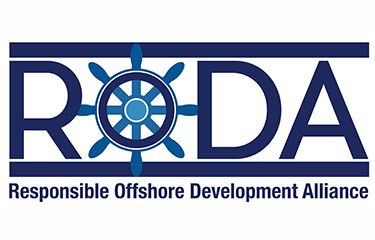The Responsible Offshore Development Alliance (RODA), an organization representing fishing industry interests related to proposed offshore wind projects in New England, has officially requested that the U.S. Coast Guard correct a study done relating to port access in parts of the region.
The study, the Massachusetts and Rhode Island Port Access Route Study (MARIPARS), does not fully take into account the full depth of fishing industry use in the region, according to a letter sent by RODA to the U.S. Coast Guard. RODA claims the report, issued on 27 May, 2020, does not take into account certain information, resulting in “fundamental omissions and calculation errors that compromise the quality, objectivity, and integrity of the information contained therein.”
The port access study has been a key source of information for decision-making on multiple offshore wind projects off the coast of New England – projects that fishermen have either been worried about or objected to in light of potential impacts to the industry in the region. RODA previously offered a series of proposals and input to the MARIPARS study process.
Now, the organization is requesting the Coast Guard take a second look at what it calls five “key errors” in the study, which include “inappropriate selection of fisheries data sources,” “complete absence of analysis of fishing vessel operational requirements,” “unjustified analysis of only one layout design rather than a range,” “inclusion of clear mathematical errors,” and “false assertions regarding radar interference.”
Inappropriate selection of fisheries data sources, according to RODA, is related to the Coast Guard’s use of Automatic Identification System technology as an indication of vessel activity and movement. However, RODA states that AIS isn’t used on the majority of affected vessels in the so-called wind energy areas [WEAs].
“Prior to initiation of the MARIPARS study, and throughout its development, multiple fisheries groups including RODA informed the USCG that the majority of fishing vessels in the [Massachusetts and Rhode Island] WEAs are not using [AIS] technology, and therefore it should not be used as a primary data source for evaluating vessel behavior,” the formal request states. “Despite this clearly communicated information, the MARIPARS nevertheless analyzed and cited only AIS data to represent fisheries activity in the WEA.”
RODA also pointed out that of 900 contacts included in stakeholder outreach, only three commercial fisheries contacts are included – one of which is a fisheries liaison officer for one of the wind developers.
The request also criticizes the lack of information on how certain conclusions were reached regarding fishing activity in the area. The MARIPARS study includes, according to RODA, statements like “the reduced turbine spacing would largely preclude fishing in the WEA,” with no background information on why those statements are made.
“Such statements would indicate that the USCG has analyzed fishing footprints and risks specific to the gear types used in the area and determined minimum viable spacing for various operations, perhaps even in differing sea states. However, this information is perplexingly absent,” the RODA request states.
The main reason for the requested corrections is directly related to the proposed wind energy projects in the New England area. The Bureau of Ocean Energy Management recently released a Supplemental Environmental Impact Statement on the project, and that new statement relies on the MARIPARS study to access navigation and impacts of proposed layouts of the project.
“We do not purport to question the USCG’s deep knowledge and professionalism regarding maritime safety but echo the concerns of thousands of fishermen and fisheries experts that the MARIPARS’ conclusions remain wholly unsupported and unsubstantiated by its associated record,” RODA wrote.







